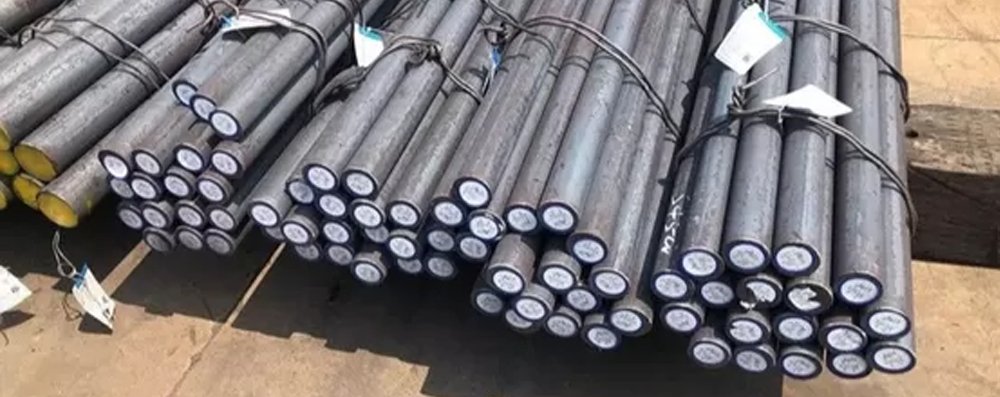Introduction
C55 is a medium-carbon steel, offering a balance of strength and toughness. It is often used in engineering and manufacturing applications where moderate tensile strength and resistance to wear and tear are required. C55 steel is heat-treatable and can be hardened to achieve higher hardness levels. Its applications range from shafts, gears, and crankshafts to other mechanical components requiring durability and strength. This grade is also well-known for its ability to undergo surface hardening for improved wear resistance.
Uses/Applications of C55 Grade:
C55 carbon steel is widely used across various industries for parts that require good strength, wear resistance, and machining capabilities.
- Automotive Industry: Ideal for manufacturing parts such as crankshafts, connecting rods, and gears that require high tensile strength and fatigue resistance.
- Mechanical Components: Used for producing shafts, axles, and pins where toughness and resistance to wear are necessary.
- Agricultural Equipment: Parts such as gears, shafts, and pins for machinery that are exposed to high stresses.
Properties of C55 Grade:
- Medium-carbon steel with moderate tensile strength and good hardness.
- Good machinability in its annealed condition.
- Heat-treatable to increase strength and hardness.
- Offers high wear resistance when hardened.
- Moderate toughness, suitable for applications requiring a balance between strength and ductility.
- Ideal for high-stress applications due to its strength and durability.
- Heavy-duty Engineering: Suitable for manufacturing components in heavy engineering applications such as couplings, bolts, and valves.
- Tools and Dies: Commonly used for manufacturing tools, dies, and other components that require moderate wear resistance and hardness.
- Industrial Machinery: Ideal for the production of machine parts exposed to wear and fatigue.
Chemical Composition (Typical):
| Element | Content (%) |
| Carbon (C) | 0.52 – 0.60 |
| Manganese (Mn) | 0.60 – 0.90 |
| Silicon (Si) | 0.10 – 0.35 |
| Sulfur (S) | ≤ 0.05 |
| Phosphorus (P) | ≤ 0.05 |
| Iron (Fe) | Balance |
Mechanical Properties (Typical in Normalized Condition):
| Property | Value |
| Tensile Strength | 700 – 850 MPa |
| Yield Strength | 400 – 500 MPa |
| Elongation (in 50 mm) | 16% min |
| Impact Strength (Charpy V-notch) | 45 J min |
| Hardness (Brinell) | 180 – 250 HB |
| Hardness (After Hardening and Tempering) | 280 – 320 HB |
Physical Properties:
| Property | Value |
| Density | 7.85 g/cm³ |
| Modulus of Elasticity | ~210 GPa |
| Thermal Conductivity | ~50 W/m·K |
| Specific Heat Capacity | ~460 J/kg·K |
| Electrical Resistivity | ~0.17 µΩ·m |
Forging:
- Forging Temperature Range: 950°C – 1150°C.
- C55 can be forged at temperatures of approximately 1050°C – 1100°C for optimal results.
- It should be slowly cooled after forging to prevent cracking and preserve material properties.
Heat Treatment:
- Annealing: Heat to 700°C – 750°C and allow slow cooling in the furnace to soften the steel and relieve internal stresses.
- Normalizing: Heat to 850°C – 880°C and air cool to refine the grain structure, improve machinability, and enhance toughness.
- Hardening: Heat to 830°C – 860°C, followed by quenching in oil or water to increase hardness and tensile strength.
- Tempering: After hardening, temper at 550°C – 650°C to adjust hardness and toughness, making the material suitable for high-stress applications.
Dimensional Tolerances:
- Hot Rolled Bars: Standard tolerances as per BS 970 or equivalent for medium-carbon steel bars.
- Cold Drawn Bars: Provide enhanced precision, better surface finish, and tighter tolerances for high-precision applications.
- Forged Bars: Custom tolerances available based on application-specific requirements.
- Straightness, roundness, and surface finish are controlled to industry standards to ensure high-quality products.
Machinability:
- Good machinability in the normalized or annealed state.
- Can be machined using standard tools such as high-speed steel (HSS) or carbide for precision cutting and shaping.
- Drilling, turning, milling, and boring are efficient with C55, especially in its annealed or normalized condition.
- Lubrication and coolant should be used during machining to reduce tool wear and improve surface finish.
Corrosion Resistance:
- Moderate corrosion resistance: C55 steel is susceptible to rusting when exposed to moisture or corrosive environments.
- Protective coatings such as galvanizing, painting, or plating are recommended for components exposed to external elements or harsh conditions.
- Proper storage and handling can minimize the risk of corrosion.
Weldability:
- Moderate weldability when in normalized or annealed condition.
- Preheating is recommended when welding thicker sections, especially for sections larger than 25 mm, with a preheating temperature of 150°C – 250°C.
- Use of low-hydrogen electrodes and appropriate filler materials ensures sound welds.
- Post-weld heat treatment may be necessary to restore toughness and prevent cracking, especially when the welded parts will be subjected to high-stress applications.
Available Form:
- Hot Rolled Bars
- Cold Drawn Bars
- Forged Bars
- Precision Ground Bars
- Custom Sizes: Available upon request.
- Standard Sizes: Available in diameters ranging from small to large, suitable for a variety of applications.
Condition: Supplied in normalized, annealed, or quenched and tempered conditions depending on customer requirements
Conclusion:
C55 Carbon Steel is a versatile and reliable material, offering excellent strength and toughness with the ability to be heat-treated for higher hardness and wear resistance. It is ideal for a range of engineering and manufacturing applications where durability, wear resistance, and machinability are crucial. Its moderate corrosion resistance necessitates protective coatings for outdoor or corrosive environments. C55’s strength, coupled with good machinability, makes it a preferred choice in automotive, mechanical engineering, and heavy-duty applications.
Related Products :20C8, ASTM A36, 20MN2, 55C8, 40C8, C45, ASTM SA-105, C50, C20, C55, EN3B, C55 Mn2, C60, C45, EN9, EN8, EN8D, IS 2062, EN43B, S355J2G3, S40C, SAE 1010, SAE 1018, ST52.3, 20MN2, Maps


